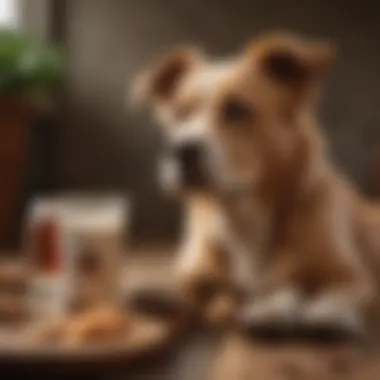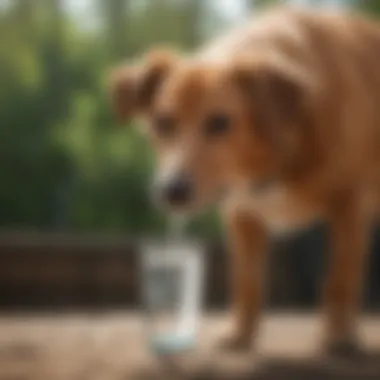Effective Dietary Solutions for Dogs with Diarrhea


Intro
Managing a dog's health involves many factors. One of the more concerning issues pet owners face is diarrhea. This condition can affect all dogs and has multiple causes, from dietary indiscretions to more serious health problems. Understanding how nutrition can help your pet recover is essential. In this guide, we aim to provide insight into dietary solutions that can aid in managing canine diarrhea. We will guide you through the causes, potential food recommendations, and when it is time to consult a veterinarian for further help.
Understanding Your Pet
In order to tackle dietary solutions for diarrhea, it is crucial to first understand your pet. Different breeds and individual temperaments may influence how they react to changes in their diet or health.
Breed Traits
Certain breeds may be more susceptible to digestive issues. For example, breeds such as the Yorkshire Terrier and Dachshund often show sensitivity with their gastrointestinal systems. Understanding these traits can better inform your feeding choices.
Common Temperaments
Temperament affects how dogs behave when they are unwell. A shy dog might hide its discomfort, whereas a more active dog could exhibit noticeable signs of distress. Knowing your pet's usual behavior helps you spot unusual patterns quickly.
Special Needs
Some dogs have special dietary needs due to prior health conditions or age. Puppies may require different nutrients or easily digestible foods compared to adult or senior dogs. Always consider these aspects when deciding on a diet during recovery from diarrhea.
Nutrition and Feeding Guidelines
Dietary management is key in resolving diarrhea. Here, we will discuss several important guidelines.
Food Choices
When dogs experience diarrhea, it is often useful to provide a bland diet. Recommended choices include boiled chicken with rice, pumpkin, or sweet potatoes. Such foods can help stabilize digestion and provide necessary nutrients.
Frequency and Portions
Smaller, more frequent meals can aid in digestion. Instead of the usual two meals a day, consider feeding smaller portions three to four times a day. This makes it easier for the digestive system without overwhelming it.
Hydration
Diarrhea can lead to dehydration, which can be dangerous. Ensure your pet has constant access to fresh water. Electrolyte solutions designed for pets may also be beneficial.
Important Note: If diarrhea persists for more than 24 hours, consult a veterinarian immediately.
When to Seek Veterinary Help
While dietary management plays a significant role, there are times when professional intervention is necessary. If you observe the following signs, take your dog to the vet:
- Blood in stool
- Persistent vomiting
- Lethargy
- Loss of appetite for more than a day
- Signs of pain or discomfort
Understanding Canine Diarrhea
Diarrhea in dogs is not just a mere inconvenience; it is a symptom that can indicate underlying health issues. Understanding the nature of canine diarrhea is key for pet owners. This awareness aids in making informed decisions about diet and care. Knowledge can lead to timely interventions and ultimately, a healthier pet. Both the frequency and consistency of stool can affect a dog's overall wellbeing, so observing these factors should be a priority for owners.
Definition and Symptoms
Canine diarrhea is defined as an increase in the frequency, volume, and fluidity of feces. Dogs may pass loose or watery stools more than usual. Symptoms accompanying diarrhea can include:
- Increased urgency to defecate: Dogs may need to go outside more frequently.
- Vomiting: This can accompany diarrhea, indicating digestive upset.
- Abdominal discomfort: Dogs may show signs of pain or discomfort by whining or acting restless.
- Lethargy: A decrease in energy levels can signal a larger issue at play.
Recognizing these symptoms early on is crucial. It can help identify the severity of the condition and its potential causes.
Common Causes of Diarrhea in Dogs
Several factors can contribute to diarrhea in dogs. It's vital to understand these to eliminate underlying causes:


- Dietary indiscretion: Dogs often eat things they shouldn't, leading to digestive upset.
- Food allergies or intolerances: Some dogs may react to specific ingredients in their diet.
- Infections: Bacterial, viral, or parasitic infections can result in diarrhea.
- Changes in diet: Abrupt changes can upset a dog's digestive system.
- Stress: Environmental changes or stressful situations can affect digestion.
Being vigilant about your dog's diet and environment can help prevent diarrhea.
When Diarrhea Becomes a Concern
Not all diarrhea episodes warrant immediate concern. However, certain situations require attention:
- If diarrhea persists for more than a day or two.
- When the dog shows signs of dehydration, such as dry gums or lethargy.
- If there is blood in the stool or unusually colored feces.
- Accompanying symptoms such as persistent vomiting.
In these cases, seeking veterinary advice is essential. Delaying can result in complications, putting the dog's health at risk. Regular monitoring and accurate assessment of symptoms lead to better outcomes.
Nutritional Needs During Diarrhea
During episodes of diarrhea, a dog's nutritional requirements dramatically shift. It becomes essential to provide proper nutrition that accommodates their digestive distress. Choosing the right foods can aid in the maintenance of energy levels and promote a quicker recovery. This section delves into pivotal aspects of nutrition tailored for dogs experiencing diarrhea.
Importance of Easily Digestible Foods
Easily digestible foods are paramount when managing diarrhea. When a dog is suffering from gastrointestinal distress, their digestive system may struggle to process complex nutrients. Hence, opting for foods that the body can assimilate effortlessly is crucial.
These foods help reduce the burden on the digestive system. Rice and boiled chicken serve as prime examples of gentle, easily digestible ingredients. By limiting the digestive workload, the body can focus on healing and regaining strength. It is critical, however, to ensure that the easily digestible option still provides essential nutrients to prevent any nutritional deficiencies during the recovery phase.
Role of Low-Fat Diets
A low-fat diet can also be beneficial when a dog suffers from diarrhea. Excess fat can exacerbate digestive problems, leading to additional discomfort. A reduction in fat content helps in the effective absorption of nutrients and aids in soothing the digestive tract.
Feeding your dog lean proteins, such as turkey or fish, will provide the necessary proteins without contributing to further gastrointestinal unrest. Additionally, low-fat diets are more likely to prevent further complications such as pancreatitis, which can occur from high-fat consumption during digestive turmoil.
Hydration and Electrolyte Balance
Maintaining hydration during diarrhea is critical. Dehydration is a severe risk for dogs experiencing loose stools. Ensuring that your dog has access to fresh water at all times cannot be overlooked.
Moreover, electrolyte balance becomes crucial at this juncture. Diarrhea can lead to loss of vital electrolytes such as sodium and potassium. Pedialyte can be an option to help restore this balance, but always consult a veterinarian first. Adding a small amount of low-sodium broth to the diet can also support hydration and electrolyte restoration.
Important: Always observe your dog for signs of dehydration, including dry gums or lethargy. If these signs appear, seeking veterinary help is non-negotiable.
Recommended Foods for Dogs with Diarrhea
When a dog experiences diarrhea, the choice of food becomes crucial. Selecting suitable foods helps in restoring the digestive system to its normal state. Dogs with diarrhea require a gentle approach to nutrition to enhance recovery while providing essential nutrients.
Boiled Chicken and Rice
Boiled chicken and rice is a classic recommendation for dogs with diarrhea. This meal is easy to digest and contains high-quality protein from chicken. The carbohydrates from rice provide energy without overwhelming the digestive tract. To prepare this dish, it is essential to use plain, unseasoned ingredients. Avoid using any fats or spices. Feeding small portions multiple times a day can help in managing their condition. This combination also helps in binding stools and can soothe the stomach.
Pumpkin and Its Benefits
Pumpkin is a beneficial food option for dogs suffering from diarrhea. It is rich in fiber, which can assist in firming up loose stools. Canned pumpkin, not to be confused with pie filling that contains sugars or spices, should be offered. About one to two tablespoons per meal can be ideal, depending on the dog’s size. The nutrients in pumpkin, particularly beta-carotene and essential vitamins, support overall digestive health and recovery.
Sweet Potatoes: A Digestive Aid
Sweet potatoes can also be a valuable part of a diet for a dog with diarrhea. They are loaded with fiber and vitamins, notably vitamin A. Cooking and mashing sweet potatoes makes them easy to digest. Generally, a small amount, about a tablespoon for small dogs or two for larger dogs, can be given along with their regular food as they recover. Sweet potatoes promote gut health and can ease digestive issues effectively.
Probiotics: Promoting Gut Health
Adding probiotics to the diet of a dog with diarrhea can enhance their gut health significantly. Probiotics are beneficial bacteria that support digestion and help restore the natural gut flora disrupted during episodes of diarrhea. There are specific probiotic supplements available for dogs, or some natural sources like plain yogurt can be beneficial. Ensure that any yogurt is free from added sugars and artificial flavors. Administering probiotics can lead to improved digestion and reduce the incidence of future gastrointestinal issues.
Regularly including these recommended foods can accelerate recovery and maintain the dog's health in the face of dietary challenges.
Foods to Avoid During Diarrhea


Maintaining a dog’s health during a bout of diarrhea involves not only selecting appropriate foods but also identifying harmful ones. Certain foods can exacerbate symptoms or lead to further digestive upset. Awareness of these food categories can aid pet owners in making informed choices to support their dog's recovery.
High-Fiber Foods
While fiber is essential in a regular diet, its role changes when a dog experiences diarrhea. High-fiber foods, such as beans, whole grains, and certain fruits or vegetables, may worsen diarrhea by increasing stool mass. In diarrhea cases, low fiber is often more beneficial as it eases the digestive process. Too much fiber can lead to increased gas and bloating, creating additional discomfort for the dog.
Dairy Products and Lactose Intolerance
Many dogs are lactose intolerant, lacking the enzyme lactase needed to digest dairy products. Giving dairy, such as milk, cheese, or yogurts, can exacerbate diarrhea, causing upset stomach and further digestive troubles. It's best to avoid all dairy products until the dog’s stomach stabilizes. The risk of providing dairy to an already fragile digestive system far outweighs any perceived benefits.
Rich or Fatty Foods
Rich and fatty foods can overwhelm a dog’s digestive system, especially when it is already compromised by diarrhea. Foods such as butter, fatty cuts of meat, and oily fish can increase the likelihood of digestive distress. They can lead to pancreatitis in some dogs, a serious inflammation of the pancreas. Avoiding these foods during the recovery period helps in maintaining digestive tranquility.
Key Takeaway: Stick to bland, easily digestible foods to allow your dog's digestive system to recover without added strain.
Understanding which foods to avoid is crucial in managing your dog’s diarrhea. By eliminating these potentially harmful food items, pet owners can help facilitate a quicker recovery, ensuring a smooth return to regular dietary habits.
Feeding Strategies for Affected Dogs
Feeding strategies play a crucial role in managing the health of dogs that experience diarrhea. Implementing the right approaches can facilitate recovery and improve digestive function. It is essential to consider the frequency and type of meals provided during this sensitive period. Each dog's situation may vary, thus customizing these strategies to the individual pet is necessary.
Smaller, Frequent Meals
Offering smaller and more frequent meals can significantly aid in the recovery of a dog suffering from diarrhea. Rather than serving large portions, dividing the daily food intake into several smaller meals helps reduce the strain on the digestive system. This approach encourages gradual digestion and absorption of nutrients, minimizing gastrointestinal upset.
Pet owners should aim for about four to six small meals per day. This frequency allows for steady nutrient intake without overwhelming the stomach. Additionally, it can be helpful to monitor the dog's reaction to each meal. If any signs of discomfort arise, adjustments can be made accordingly.
Gradual Foreword of Regular Diet
Once symptoms begin to improve, reintroducing regular food should be done gradually. This process should start as soon as the dog shows signs of being able to maintain food without further issues. A sudden switch back to a dog's regular diet can cause a setback in recovery.
Owners should mix small amounts of the regular diet with the bland diet previously offered. This could include combining boiled chicken or rice with small amounts of their usual kibble. The goal is to gradually increase the regular food while decreasing the bland options over several days. A slow transition minimizes the risk of triggering diarrhea again and allows the dog's digestive system to adjust.
Monitoring Recovery Through Diet
Careful monitoring during the recovery phase is important. Pet owners should keep track of any changes in their dog's stool consistency and overall behavior after meals. Recording this information provides valuable insights into how well the dog is responding to the dietary changes.
Notably, any signs of illness or persistent diarrhea should prompt a re-evaluation of the feeding strategy and consultation with a veterinarian.
Choosing the right foods and following appropriate feeding strategies can make a significant difference in a dog's recovery from diarrhea. Staying vigilant and responsive to dietary needs is essential for promoting overall health and well-being.
When to Consult a Veterinarian
In cases of canine diarrhea, it is crucial to monitor your dog closely and to understand when professional veterinary assistance is needed. Pet owners often feel uncertain about the severity of the situation and may hesitate before contacting a vet. However, timely intervention can be key in preventing potential complications. Recognizing the signs and knowing the right course of action is essential for your pet's recovery.
Signs of Dehydration
Dehydration is a primary concern with diarrhea in dogs. Diarrhea can rapidly lead to fluid loss, making it vital for owners to identify symptoms of dehydration early. Some common signs include:
- Dry gums and tongue: Check your dog’s mouth for moisture. Dryness is a serious indicator.
- Skin tenting: Lightly pull up the skin on the back of the neck. If it doesn’t fall back quickly, dehydration may be present.
- Lethargy: A noticeable decrease in energy or responsiveness can indicate dehydration.
- Sunken eyes: Dehydrated dogs might have dull and sunken eyes instead of bright and round ones.
If you observe these signs in your dog, it is important to seek veterinary advice as soon as possible. Dehydration can escalate quickly, making timely treatment vital.
Persistent or Severe Diarrhea
Diarrhea that lasts more than a day or is accompanied by other severe symptoms should be taken as a serious signal. If your dog has ongoing episodes of diarrhea, particularly if it appears to be watery or contains blood, there is a higher risk of dehydration and other complications. Additional symptoms that warrant a visit include:
- Vomiting: Frequent or severe vomiting alongside diarrhea is a concern.
- Abdominal pain: If your dog shows signs of discomfort or pain, it may suggest a more serious issue.
- Change in behavior: If your dog becomes unusually withdrawn or exhibits signs of distress, it is best to consult a vet.


Veterinarians can conduct tests to determine the underlying cause, ranging from infections to food allergies, and they can provide the appropriate treatment.
Underlying Health Conditions
Some dogs may already have existing health issues that can complicate diarrhea. Conditions such as pancreatitis, liver disease, or inflammatory bowel disease can make it more difficult for dogs to cope with digestive problems. If your dog has a known medical history, monitor any changes closely. Look for:
- Worsening of known conditions: If your dog has pre-existing health issues, diarrhea may exacerbate their condition.
- Age factors: Older pets may be at a higher risk for complications.
- Medication interaction: If your dog is on medication, consider how it might interact with any dietary changes.
A veterinarian can review your dog’s medical history, conduct necessary tests, and develop a tailored treatment plan aimed at addressing both diarrhea and any existing conditions.
It's important to recognize when your pet's health requires professional input. Delaying could lead to unnecessary suffering for your dog and increased complications.
In summary, pet owners should prioritize vigilance in monitoring their dog's health during episodes of diarrhea. Understanding when to contact a veterinarian could make a substantial difference in your pet’s health and recovery.
Long-Term Dietary Management
Long-term dietary management is critical for dogs recovering from diarrhea. Proper nutrition influences recovery and helps prevent future digestive issues. It is essential to understand how ongoing dietary choices can impact your dog’s overall health and well-being. Making informed decisions about dog nutrition can reduce the frequency of gastrointestinal disturbances, allowing dogs to thrive in their daily lives.
Establishing a Balanced Diet Post-Diarrhea
After an episode of diarrhea, it is very important to establish a balanced diet. A balanced diet should contain the right amounts of protein, fats, carbohydrates, vitamins, and minerals. Dogs require specific nutrients for optimal function. The transition back to regular food should be gradual. At first, lean proteins such as chicken or turkey are advisable. Gradually reintroducing regular dog food is essential. This helps to ensure that the digestive system can adjust without becoming overwhelmed.
Considerations for a balanced diet include:
- Incorporating highly digestible proteins: Chicken and fish are good examples.
- Adding carbohydrates: Sweet potatoes or rice are easily digestible options.
- Including beneficial fats: Fish oil can support digestion and health.
Avoid too many sudden changes in diet as they can lead to another bout of diarrhea. Continuity in the diet leads to better stability in digestive health.
Regular Monitoring of Dietary Changes
Monitoring dietary changes regularly plays an important role in managing a dog's health post-diarrhea. Pet owners should observe their dog's reactions to new foods. If a particular food causes digestive upset, it should be removed immediately. It's essential to take notes on any responses, such as bowel movement consistency and mood changes. Keeping a record allows for informed decisions and adjustments as needed.
Some practical tips for monitoring include:
- Daily observation of stool quality: Look for firm and regular bowel movements.
- Assess overall behavior: Watch for increased energy levels and appetite.
- Adjust the feeding schedule accordingly: If the dog’s appetite seems low, smaller portions may help.
It can be beneficial to consult with a veterinarian if changes are significant or concerning. Ongoing dietary management ensures a healthy, happy dog. Regular adjustments can create a stable routine that favors digestive health in the long term.
"A well-planned diet is the cornerstone of health and recovery."
Maintaining a proper long-term dietary approach reduces the chances of recurrent diarrhea, ensuring that your dog experiences less stress related to their digestive health.
Closures and Recommendations
In dealing with diarrhea in dogs, it is essential to have a clear understanding of how proper nutrition can influence recovery. The conclusions drawn in this article underline the significance of dietary choices during such episodes. When a dog experiences diarrhea, the digestive system becomes compromised, making it vital to provide easily digestible and nutritious options. Owners must be familiar with what foods to incorporate and which ones to avoid.
The benefits of following a carefully tailored diet include quicker recovery times and a reduction in recurrence of digestive issues. A thoughtful approach to nutrition addresses both immediate needs and long-term health, as good diet management can strengthen the immune system. Moreover, consistent monitoring for improvements in a dog's condition is crucial. Paying attention to hydration and ensuring regular intake of nutrient-dense foods can make a significant difference.
Pet owners should also consider the animal’s preferences and any underlying health conditions. Thus, personalizing the dietary approach, while ensuring it meets the dog's specific needs, is key.
"The right food choices during a period of illness can set the stage for long-lasting health."
Summary of Dietary Options
The dietary options available for dogs suffering from diarrhea are diverse. Boiled chicken and rice are often recommended as they are bland and easy on the stomach. Pumpkin is another beneficial choice due to its high fiber content which aids digestion. Similarly, sweet potatoes can be soothing to the digestive tract and provide essential nutrients. Adding probiotics can further promote gut health by introducing beneficial bacteria into the system.
Here’s a brief overview of beneficial dietary options:
- Boiled chicken and rice
- Canned pumpkin (not spiced)
- Mashed sweet potatoes
- Probiotics (like those from yogurt or supplements)
It is important to gradually introduce any new food to ensure the dog can tolerate it.
Encouragement for Consistent Care
Ongoing care is vital. Once diarrhea has resolved, pet owners should not overlook the importance of maintaining a balanced diet. An established routine for feeding can help keep a dog's digestive system stable. Regular monitoring is necessary, as is a readiness to adapt dietary choices according to ongoing health observations. Consistent care also means providing the dog access to fresh water at all times to prevent dehydration.
In summary, while the focus during acute diarrhea may be on immediate relief, the longer-term approach should foster overall health. Engaging in consistent dietary management will lead to better health outcomes for dogs, helping them remain fit, active, and happy.



